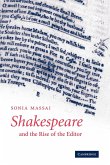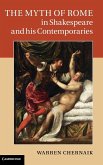- Broschiertes Buch
- Merkliste
- Auf die Merkliste
- Bewerten Bewerten
- Teilen
- Produkt teilen
- Produkterinnerung
- Produkterinnerung
Tucker's 1924 edition of Shakespeare's Sonnets contains a thorough introduction and detailed commentary and notes.
Andere Kunden interessierten sich auch für
![Shakespeare and the Rise of the Editor Shakespeare and the Rise of the Editor]() Sonia MassaiShakespeare and the Rise of the Editor35,99 €
Sonia MassaiShakespeare and the Rise of the Editor35,99 €![Shakespeare and the Nobility Shakespeare and the Nobility]() Catherine Grace CaninoShakespeare and the Nobility46,99 €
Catherine Grace CaninoShakespeare and the Nobility46,99 €![Shakespeare and the Power of Performance Shakespeare and the Power of Performance]() Robert WeimannShakespeare and the Power of Performance48,99 €
Robert WeimannShakespeare and the Power of Performance48,99 €![Shakespeare and the Natural World Shakespeare and the Natural World]() Tom MacfaulShakespeare and the Natural World32,99 €
Tom MacfaulShakespeare and the Natural World32,99 €![Shakespeare Films in the Making Shakespeare Films in the Making]() Russell JacksonShakespeare Films in the Making97,99 €
Russell JacksonShakespeare Films in the Making97,99 €![The Cambridge Companion to Shakespeare and Popular Culture The Cambridge Companion to Shakespeare and Popular Culture]() Robert Shaughnessy (ed.)The Cambridge Companion to Shakespeare and Popular Culture109,99 €
Robert Shaughnessy (ed.)The Cambridge Companion to Shakespeare and Popular Culture109,99 €![The Myth of Rome in Shakespeare and his Contemporaries The Myth of Rome in Shakespeare and his Contemporaries]() Warren ChernaikThe Myth of Rome in Shakespeare and his Contemporaries93,99 €
Warren ChernaikThe Myth of Rome in Shakespeare and his Contemporaries93,99 €-
-
-
Tucker's 1924 edition of Shakespeare's Sonnets contains a thorough introduction and detailed commentary and notes.
Hinweis: Dieser Artikel kann nur an eine deutsche Lieferadresse ausgeliefert werden.
Hinweis: Dieser Artikel kann nur an eine deutsche Lieferadresse ausgeliefert werden.
Produktdetails
- Produktdetails
- Verlag: Cambridge University Press
- Seitenzahl: 336
- Erscheinungstermin: 15. Juli 2009
- Englisch
- Abmessung: 216mm x 140mm x 20mm
- Gewicht: 475g
- ISBN-13: 9781108003780
- ISBN-10: 1108003788
- Artikelnr.: 26870468
- Herstellerkennzeichnung
- Libri GmbH
- Europaallee 1
- 36244 Bad Hersfeld
- gpsr@libri.de
- Verlag: Cambridge University Press
- Seitenzahl: 336
- Erscheinungstermin: 15. Juli 2009
- Englisch
- Abmessung: 216mm x 140mm x 20mm
- Gewicht: 475g
- ISBN-13: 9781108003780
- ISBN-10: 1108003788
- Artikelnr.: 26870468
- Herstellerkennzeichnung
- Libri GmbH
- Europaallee 1
- 36244 Bad Hersfeld
- gpsr@libri.de
William Shakespeare (bapt. 26 April 1564 - 23 April 1616)[a] was an English poet, playwright, and actor, widely regarded as the greatest writer in the English language and the world's greatest dramatist. He is often called England's national poet and the "Bard of Avon" (or simply "the Bard"). His extant works, including collaborations, consist of some 39 plays,[c] 154 sonnets, two long narrative poems, and a few other verses, some of uncertain authorship. His plays have been translated into every major living language and are performed more often than those of any other playwright.[7] Shakespeare was born and raised in Stratford-upon-Avon, Warwickshire. At the age of 18, he married Anne Hathaway, with whom he had three children: Susanna and twins Hamnet and Judith. Sometime between 1585 and 1592, he began a successful career in London as an actor, writer, and part-owner of a playing company called the Lord Chamberlain's Men, later known as the King's Men. At age 49 (around 1613), he appears to have retired to Stratford, where he died three years later. Few records of Shakespeare's private life survive; this has stimulated considerable speculation about such matters as his physical appearance, his sexuality, his religious beliefs, and whether the works attributed to him were written by others. Shakespeare produced most of his known works between 1589 and 1613.[11][12][d] His early plays were primarily comedies and histories and are regarded as some of the best work produced in these genres. Until about 1608, he wrote mainly tragedies, among them Hamlet, Othello, King Lear, and Macbeth, all considered to be among the finest works in the English language. In the last phase of his life, he wrote tragicomedies (also known as romances) and collaborated with other playwrights. Many of Shakespeare's plays were published in editions of varying quality and accuracy in his lifetime. However, in 1623, two fellow actors and friends of Shakespeare's, John Heminges and Henry Condell, published a more definitive text known as the First Folio, a posthumous collected edition of Shakespeare's dramatic works that included all but two of his plays.[13] The volume was prefaced with a poem by Ben Jonson, in which Jonson presciently hails Shakespeare in a now-famous quote as "not of an age, but for all time".[13] Throughout the 20th and 21st centuries, Shakespeare's works have been continually adapted and rediscovered by new movements in scholarship and performance. His plays remain popular and are studied, performed, and reinterpreted through various cultural and political contexts around the world.

Bild: Wikipedia
Preface
1. Introduction
2. Abbreviations
3. Sonnets
4. Commentary
Index.
1. Introduction
2. Abbreviations
3. Sonnets
4. Commentary
Index.








